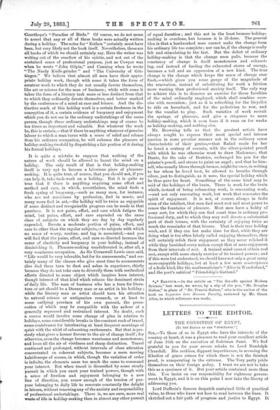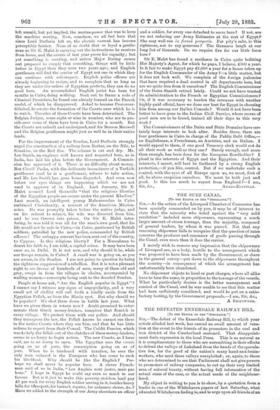LETTERS TO TIIE EDITOP
THE CONDITION OF EGYPT.
[To TRII EDITOR Or THE " SPIRITATOR."] SIR,—To those of us in Egypt who have the interests of the country at heart, it was a pleasure to read your excellent article of June 1611 on the execution of Suleiman Sami. We feel grateful to you for your severe rebuke to Lord Randolph Churchill. His reckless, flippant impertinence, in accusing the Khedive of grave crimes for which there is not the faintest proof, is exasperating in the extreme. The Tory party pride themselves on their foreign policy. I trust we are not to take this as a specimen of it. But your article contained more than this. You insist on our responsibility for righteous govern- ment in Egypt, and it is on this point I now take the liberty of addressing you.
Lord Dufferin's famous despatch contained little of practical value, to those who knew not how to read between the lines. It sketched out a fair path of progress and justice to Egypt. It left unsaid, but yet implied, the motive-power that was to keep the machine moving. Now, somehow, we all feel here that since Lord Dufferin left us, the electric current has become perceptibly fainter. None of us doubt that so loyal a gentle- man as Sir E. Malet is carrying out the instructions he receives from home, and the events of last year prove his capacity ; but yet something is wanting, and unless Major Baring comes out prepared to supply that something, things will be little better in Egypt than they were two years ago ; and English gentlemen will find the service of Egypt not one in which they can continue with self-respect. English police officers are already beginning to resign, and to complain that as long as they are under the orders of Egyptian prefects, they can do no good here. Au accomplished English jurist has been for months in Cairo, doing nothing. Sent out to frame a code of Criminal Procedure, he found one already framed on the French model, of which he disapproved. Asked to become Procureur- G6nera], he awaits the formation of the Courts over which he is to watch. The sites of these Courts have been determined. The Belgian Judges, some eight or nine in number, who are to pre- side over some of them have been in Cairo for a month. But the Courts are unbuilt and undesigned, and Sir Benson Maxwell and the Belgian gentlemen might just as well be in their native lands.
For the improvement of the Soudan, Lord Dufferin strongly urged the construction of a railway from Berber, on the Nile, to Sonakim, on the Red Sea. The scheme is cut and dry. Mr. Lee Smith, an engineer well known and respected here, as in India, has laid his plan before the Government. A Commis- sion has approved of it. There is no difficulty about money. But Cherif Pasha, with the deliberate insouciance of a Turkish gentleman (and he is a gentleman), refuses to take action, and Mr. Lee Smith has gone home disgusted. And even now before our eyes things are happening which we are not used to approve of in England. Last January, Sir E. Malet acsurel Lord Granville "that the religious liberties of the Egyptian people are secure under the present Khedive." Last month, an intelligent young Mahommedan in Cairo embraced Christianity, a convert of the American Mission- aries. He was promptly taken before the native judge, and on his refusal to retract, his wife was divorced from him, and he was thrown into prison. On Sir E. Malet inter- fering, he was told it was all for the man's own good, that his life would not be safe in Cairo,—in Cairo, garrisoned by British soldiers, patrolled by the new police, commanded by British officers ! The unhappy convert has been sent out of the country, to Cyprus. Is this religious liberty ? For a Mussulmau to desert his faith is, I am told, a capital crime. It may have been once so, in Delhi. It is not now, and why should it be, while our troops remain, in Cairo ? A small war is going on, as you are aware, in the Soudan. I am not going to question its being the righteous suppression of a rebellion. But it is not a pleasant sight to see droves of hundreds of men, many of them old and grey, swept in from the villages in chains, accompanied by wailing women,—conscripts being sent to the dreaded Soudan.
People at home ask, "Are the English popular in Egypt" P I cannot say I witness any signs of unpopularity, and a very small act of civility will call forth a kindly smile from the Egyptian Fellah, as from the Hindu ryot. But why should we be popular ? We shot them down in battle last year. What have we given them in return now ? Arabi promised to exter- minate their Greek money-lenders, vampires that flourish in every village. We protect them with our police. And should they transgress the law, the Fellah knows he cannot sue them in the native Courts where they sue him, and that he has little redress to expect from their Consul. The Credit Fencier, which was to help the fellah out of the clutches of these money-lenders, seems in no hurry to begin action. The new Courts, as I have said, are in no hurry to open. The Egyptian sees the corvee going on as of yore, the conscription going on as of yore. When he is burdened with taxation, he sees the only man untaxed is the European who has come to suck his life-blood. Why should he like the English ? Per- haps we shall never be popular here. A clever French- man said of us in India, 'Les Anglais sont justes, mais pas bons." I hope in Egypt he could say even so much in our favour. But is it just to make this poverty.stricken land pay RI per week for every English soldier serving in it, besides heavy bills for Ansport, for barrack repairs, for ordnance stores, &c.? Have we added to the strength of our Army elsewhere an officer and a soldier, for every one detached to serve here ? If not, are we not reducing our Army Estimates at the cost of Egypt? She may well sue in. forma' pauperis. For pity's sake, is this righteous, not to say generous ? The Germans laugh at our long list of Generals. Do we require five for our little force here P
Sir E. Malet has found a residence in Cairo quite befitting Her Majesty's Agent, for which he pays, I believe, £300 a year. Is it fair to make Egypt pay 21,000 a year for a house taken up for the English Commander of the Army ?—a little matter, but it does not look well. We complain of the foreign jealousies. that have required a dual control in all departments here, but are we quite free from it ourselves ? The English Commissioner of the Daira Sanieh retired lately. Could we not have trusted its administration to the French or Egyptian Commissioners ? Or, if it was necessary to burden the revenues with another highly-paid official, have we done our best for Egypt in choosing him from among our Italian Consuls ? Would it not have been better to have gone to the Indian Civil Service, where scores of good men are to be found, trained all their days to this very work ?
The Commissioners of the Daira and State Domains have cer- tainly large interests to look after. Besides these, there are four gentlemen in Cairo in charge of the Public Debt Office,— an Englishman, a. Frenchman, an Austrian, and an Italian. I would appeal to them, if one good Treasury clerk would not do all their work as well as they can? Surely enough, and more than enough, has been done for the European Bondholder? I plead in the interests of Egypt and the Egyptian. And their interests, I assert, will best be furthered by a strong English protection,—if you like, control. But if we undertake such a. control, with the eyes of all Europe upon us, we must, first of all, be above suspicion ourselves. We must be both just and good. Is this too much to expect from England P—I am,.



































 Previous page
Previous page